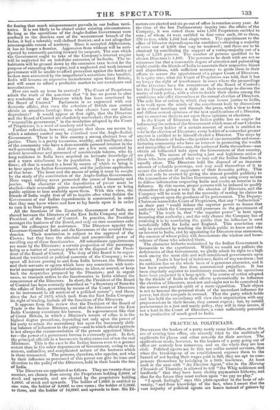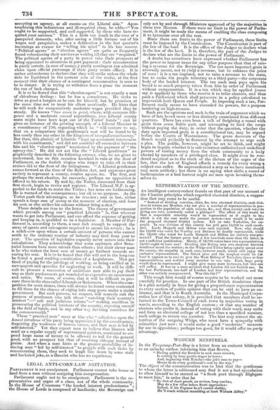PRACTICAL POLITICIANS.
DOUBTLESS the leaders of a party newly come into office, or on the eve of coming into office, are severely tried by the multitude of applicants for places and other rewards for their services. The applications made, however, to the leaders of a party going out of office are scarcely less numerous, and on the whole they are less civil. Political agents are in this not unlike menial servants, that when the breaking-up of an establishment exposes them to the hazard of not having their wages paid in full, they are apt to com- pensate themselves by indulging in a little insolence. At least such is the case with "An Election Agent," who in the Morning Chronicle of Thursday is allowed to tell " the Whig noblemen and landlords" that they have been shabby paymasters hitherto, and that for the future they must reckon upon "no pay no play." "I speak feelingly," says this plain-speaker in the hour of ad- versity, " and from knowledge of the fact, when I assert that the vast majority of political agents are losers instead of gainers by
accepting an agency, at all events on the Liberal side." Apos- trophizing this industrious and ill-requited class, he adds—" You
ought to be supported, and well supported, by those who have re-
quired your services." This is a little too much in the tone of a pampered domestic, who, after saving a little fortune out of his wages and perquisites, makes a defalcation in the last quarter's incomings an excuse for "telling his mind" to his late master. "Political agents" or "election agents" are quite as frequently found volunteering their services as waiting till they are " required. The political agents of a party in power take their prospects of being appointed to situations in part payment : their remuneration is partly certain, (a sum of money,) partly contingent (an admitted claim upon official patronage if their party retain office). It is rather unhandsome to declare that they will strike unless the whole
debt be liquidated in the current coin of the realm, at the first moment that their chance of a contingent remuneration is seen to be in danger. It is trying to withdraw from a game the moment the run of luck changes.
It is to be feared that this " election agent" is not exactly a man of chivalrous feelings : but he has a conscience. He seeks to drive as good a bargain as he can for himself, but he promises at the same time not to treat his client usuriously. He hints that he will work for comparatively moderate wages provided they be
steady. He knows "two cases in point, where, with common dili- gence and a moderate annual expenditure, two Liberal county seats might have been kept out of the Tories' hands": and he gives an instance of the growing strength of a Liberal Member in a constituency of 750, regarding which he " will venture to say, that on a comparison this gentleman's seat will be found to be less costly than any other in the kingdom of an equal constituency." But then, this phoenix of Liberals "kept up a constant iutercourse with his constituents," and did not consider all connexion between him and his "election agent" terminated by the payment of " the agency-fee." He did not act like the " Liberal gentleman " so graphically described in the following extract, who, we are given to understand, has on this occasion knocked in vain at the door of Parliament, as the foolish virgins who forgot to take oil in their cruises did at the door of the bridegroom. "A Liberal gentleman comes forward at the time of the Reform Act, and expresses great anxiety to represent a county, retains agents, &c. The first, and perhaps the next election, he succeeds ; perhaps no opposition is offered to his return. By and by, the Tories, recovered from their first shock, begin to revive and register. The Liberal M.P. is ap- pealed to for funds to resist the Tories ; but none are forthcoming. He is warned of the consequences ; but all to no purpose. As the Tories push their advantages, so he recedes ; and at last, either spends a large sum of money at the moment of election, and loses his seat, or else strikes his colours without firing a shot."
These details are true to the letter. The theory of government which prevails among our " practical Liberals" is, that whoever wants to get into Parliament, and can afford the expense of getting and keeping io, is qualified to be a legislator. A Member of Par- liament is, according to them, a man rich enough to support the array of agents and sub-agents required to secure his return : he is a milch-cow upon whom a certain amount of persons who cannot settle to the ordinary routine of industry may feed from year to year. The question of legislative capacity never enters into their calculations. They acknowledge that some aspirants after Sena- torial honours have more talents than others ; but their clever man is he who makes the least sum of money go furthest towards se- curing his seat. It is to be feared that this will not in the long run be found a good working constitution cf a Legislature. Men get tired of paying for the privilege of working, or being cavilled at in newspapers and speeches for neglecting to work. It will be diffi- cult to procure a succession of ambitious men able to pay their way as their predecessors get wearied of so expensive an amusement and retire. We mean, of course, that it will be difficult to pro- cure them in the class called Liberals or Reformers. When the com- petition for seats abates, there will always be found some contented to fill them for the chance of edging into snug posts under a stable government. But such persons, we suspect, will scarcely suit the purpose of gentlemen who talk about " watching their country's Interest "—" safe and judicious reform "—" making sacrifices in prosecuting the political interests of the country, exposing oneself in the field of battle, and in any other way devoting ourselves for the commonwealth."
These " practical men" sneer at him who " calculates upon the honest intentions of his party being appreciated by the constituency, forgetting the weakness of human nature, and that man is led by self-interest." Yet they expect men to believe that Heaven will send us a regular supply of supernatural patriots, contented to ex- pend large sums of money to be allowed to toil for the general good, with no prospect but that of receiving obloquy instead of praise. And when a man hints at the greater probability of in- ducing men "led by self-interest" to grapple with such tasks by remunerating them, they seek to laugh him down by some stale and hacknied joke, as a theorist who has no experience.



























 Previous page
Previous page